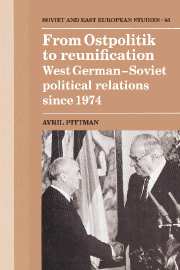Book contents
- Frontmatter
- Contents
- List of tables
- Preface
- Note on text
- Chronology
- Introduction
- 1 The Second World War and its aftermath, 1945–1974
- 2 Ethnic Germans
- 3 Berlin
- 4 The Federal Republic of Germany's relations with the German Democratic Republic
- 5 INF, Afghanistan and the post-Afghanistan period
- 6 Assessment of the Federal Republic of Germany's relations with the Soviet Union, 1974–1982
- 7 The Federal Republic of Germany's political relations with the Soviet Union after 1982
- Appendices
- Notes
- Bibliography
- Index
- Series list
2 - Ethnic Germans
Published online by Cambridge University Press: 12 October 2009
- Frontmatter
- Contents
- List of tables
- Preface
- Note on text
- Chronology
- Introduction
- 1 The Second World War and its aftermath, 1945–1974
- 2 Ethnic Germans
- 3 Berlin
- 4 The Federal Republic of Germany's relations with the German Democratic Republic
- 5 INF, Afghanistan and the post-Afghanistan period
- 6 Assessment of the Federal Republic of Germany's relations with the Soviet Union, 1974–1982
- 7 The Federal Republic of Germany's political relations with the Soviet Union after 1982
- Appendices
- Notes
- Bibliography
- Index
- Series list
Summary
Humanitarian considerations have always been of great importance in the FRG's Ostpolitik in general, the process of normalisation of relations with the East and in its relations with the Soviet Union in particular. The state of German–Soviet relations, apart from playing a key role in humanitarian improvements in FRG–GDR relations and the West Berlin situation, also affected a specific bilateral problem between the FRG and the USSR – that of emigration rights for Germans living in the Soviet Union. This was true as long ago as 1955 when the establishment of diplomatic relations between the FRG and the Soviet Union made the solving of humanitarian problems easier. During his visit to Moscow, as well as securing the release of German prisoners of war held in the Soviet Union, Chancellor Adenauer was also able to obtain agreement in principle to return some 130,000 civilians of German origin who had applied to the Federal authorities for repatriation.
Family reunification and emigration rights for ethnic Germans living in the Soviet Union is an issue to which the Federal Republic attaches great importance and one which is given a high priority. Indeed, emigration rights for ethnic Germans living in Eastern Europe in general was part of the FRG's price for détente with the USSR. However, the numbers of ethnic Germans allowed to leave the Soviet Union have in the past been small proportional to their overall population size, with a marked decline between 1977 and 1983. There were several underlying reasons for this but the Soviet response must also be seen against the background of Soviet nationality problems in general and the implications of what was at stake for that country (see pp. 27–31).
- Type
- Chapter
- Information
- From Ostpolitik to ReunificationWest German-Soviet Political Relations since 1974, pp. 13 - 31Publisher: Cambridge University PressPrint publication year: 1992

